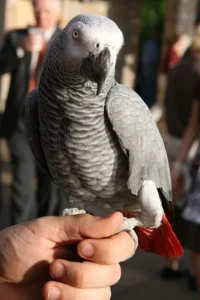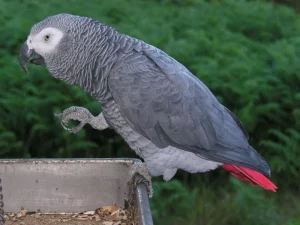One of the most “poster-perfect” parrot species is the African grey. But they are notorious for having a high level of intelligence and become anxious when kept in captivity.
African greys do not bite all the time. But it may bite if it is under stress. They require substantial social and behavioral stimulation because they are also quite gregarious. You may be sure your pet parrot would experience extreme stress without these and possibly engage in biting behavior.
We are aware of the stress that comes with having a parrot bite someone or anything. So, this post has been dedicated to them, as we will decipher the facts associated with African gray parrot bites.
African grey parrot bite force?
An African grey parrot has 400 psi of maximum bite strength. Therefore, it is not shocking to realize that the bite may be among the worst things to ever happen to anyone. To give you a perspective, let us tell you that a human bite can reach only 130 psi.
This considerable biting force explains how these parrots’ sharp beaks can easily pierce tough seeds and nuts.
So, if you own an African grey, be prepared to get bit and get serious injuries that might even need stitching and medical attention. The bite can also spread infections to people. Therefore, training young birds and providing them with enough stimulation to prevent behavioral problems is crucial.

Do African grey bites hurt?
African greys may bite very hard and leave painful wounds. Sometimes the wounds become so severe that you must seek medical attention immediately.
In contrast to other parrot species, grey parrots have a pointed needle-like beak tip. So, if they bite, it will undoubtedly be painful. As a result, if you are new to handling African grey parrots, it is recommended that you use protective gloves while doing so.
Why do African grey parrots bite?
“Why do parrots bite”- is one of the most pertinent questions among parrot owners and bird enthusiasts. So, today, we’ll answer this topic by considering African parrots.
African grey parrots bite out of fear and because they are territorial. But these aren’t the only two reasons these birds can bite; there are several others.
Some other reasons that can make African greys bite are the following:
Aggression
An aggressive African grey can really bite anyone hard. So, if something triggers their anger, make sure to remove it.
Untamed
If your parrot is untamed, it will constantly be afraid of people approaching the cage, including you. It might even be afraid of people just walking close by. And if you put your hand inside the cage in such a situation, the bite can occur.
Note: Taming birds or any other animal entails teaching them not to be frightened of humans and to obey their commands.
Lack of stimulation
Due to their high level of intelligence, African grey parrots require substantial behavioral and social stimulation. In captivity, they also require attention from their owner to avoid being upset. And if they lack these things, they may become stressed and develop biting behavior.
Molting
African greys go through a great deal of stress during their molt, which frequently causes them to bite. The method causes the bird tension and may highly irritate it.
Note: Old feathers are shed during molting to make room for fresh ones. When a bird molts, it develops new plumage that can help identify its age, gender, and phase of the year.
Hunger
African grey parrots’ biting habit can also be caused by hunger and thirst.
Hormones
African grey parrots experience significant biological imbalances during molting and breeding. These are often the times when these birds undergo stress, anxiety, and other psychological changes. So, even if the bird is tamed and taught, hormonal changes might cause biting.
Playing
Another cause of African grey bites is playing. Biting during playtimes, however, is not as intense as biting fear or stress. To stop any “severe biting” problems in the future, however, do not encourage this habit.
Dominance
If someone approaches their nest or possessions, your African grey may bite or attack them to demonstrate its dominance. Therefore, it’s crucial to socialize your birds with animals and humans while they’re still young.
How to stop African grey parrots from biting?

A biting pet parrot can be a real problem. But the good news is that there are ways to prevent an African grey parrot or any other parrot’s biting behavior.
If you begin early, stopping your African grey is simple. Here are some steps you can take to get there.
Training
Training your bird to engage with others while still young is always a good idea. It will assist it in learning sociability, not fearing humans or other pets, and biting them out of fear.
Teaching
African greys have a high level of intelligence. So, educating them in behavior is critical, or else they may develop behavior problems, like biting their own feathers or others’ fingers.
Don’t annoy
As previously indicated, parrots are extremely stressed during the molting period. As a result, try not to irritate them during that time.
Stimulation
Make it stimulating enough to keep them from becoming bored and developing biting behavior.
Attention
Give your bird adequate attention. To connect with their owners, these parrots require their owners’ attention.
No negative gesture
Never make menacing gestures with your hands to stress them out.
Learn the triggers
Remove the triggers that irritate or frighten the bird. This is the most effective strategy to keep them from biting or engaging in other problematic conduct.
Don’t make rapid movements
Avoid moving quickly near your bird.
No intrusion
Don’t trespass on its domain. African greys can become annoyed and aggressive and bite you in self-defense.
Garin trust
Gain the trust of your bird. This is necessary for the bird to allow you to approach it and accept you as a friend.
Can an African grey parrot bite your finger off?
A healthy adult normally does not face the fear of getting their fingers bitten off by African grey parrots. Children, however, may face a different situation. It is conceivable for kids to lose a finger due to a hard bite from an African grey parrot.
The worst bites are, however, the side bites. This is the most potent and hazardous. But fortunately, a front beak bite can leave a wound but will never amputate a finger.
Summary
So, in conclusion, African grey parrots bite. However, assuming that this proclivity is universal would be incorrect. Under some conditions, these birds will bite. However, you can lessen their biting habit by discovering and eliminating the causes.
